#Current Affairs
A Response To Habib Ali Al-Jifri’s Comments On Uyghurs
Toqa Badran and Aydin Anwar respond to the statements made by Shaykh Habib Ali Al-Jifri

Published
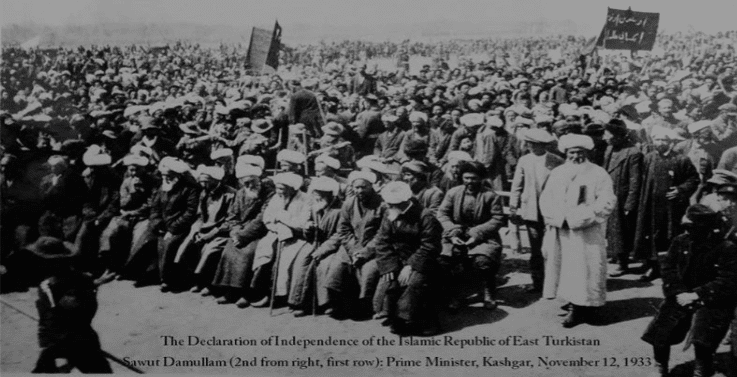

Protests preceding the Ghulja Massacre, 1997
Keep supporting MuslimMatters for the sake of Allah
Alhamdulillah, we're at over 850 supporters. Help us get to 900 supporters this month. All it takes is a small gift from a reader like you to keep us going, for just $2 / month.
The Prophet (SAW) has taught us the best of deeds are those that done consistently, even if they are small. Click here to support MuslimMatters with a monthly donation of $2 per month. Set it and collect blessings from Allah (swt) for the khayr you're supporting without thinking about it.
By Toqa Badran, Aydin Anwar
We acknowledge that those individuals who have devoted their lives to the spiritual empowerment of others are to be admired and respected. The Ulema often serve as beacons of guidance and sources of emulation for the Ummah with their scholarly and moral leadership. Their critical role means that they are also expected to speak and act according to a higher standard of truthfulness and ethics. Bearing this in mind makes it especially dismaying and hurtful to witness inaccurate comments from a famous preacher and scholar who should be a part of this heritage of high intellectual rigour and superior moral conduct. It is even more problematic that these erroneous statements pertain to a group of fellow Muslims presently experiencing almost unprecedented duress to criminalize and eradicate their religion and cultural identity.
It is unfortunate that Habib Ali al-Jifri, a popular scholar in the Arab world, in a recent lecture has misused his platform by propagating information that is all at once incorrect, biased, and otherwise detrimental to the lives of an entire Muslim nation colonized and oppressed by China. Although he tepidly acknowledges that China has done wrong to Uyghurs and is not fully innocent, a number of his claims remain inaccurate and deserve to be corrected. This article attempts to walk through some of these inaccuracies, and correct such claims that ultimately work to delegitimize and downplay the deplorable reality of Uyghurs and other Turkic-Muslim peoples, such as Kazakhs and Kyrgyz, of East Turkistan (renamed and referred to as Xinjiang, meaning new territory in Mandarin, by the Chinese occupation).
#1: Shaykh Ali al-Jifri claims that only around half of Uyghurs are Muslim
The first glaring error made by the shaykh is his statement that only around half of the Uyghur population is Muslim. His error may have been a result of confusing the presently reported demographic makeup of East Turkistan with the religious composition of the Uyghur people. While the Uyghur and indigenous inhabitants of the region are overwhelmingly Muslim, the Han Chinese population has climbed drastically from only 6% in 1949 to an estimated 40% – due largely to incentivized migration and other – settler colonial programs embarked upon by the Chinese Communist Party (CCP). This statistic itself may be unreliable as many undocumented Uyghurs are unaccounted for and, in recent years, scores of Uyghur prisoners and forced laborers have been forcibly transferred to mainland China.
If, however, al-Jifri meant to propogate the notion that only half of Uyghurs are Muslim, this is another matter altogether. To deny the self-professed Islamic faith of the utter majority of Uyghur people is to commit one of atrocities perpetrated by the CCP itself — the denial and erasure of this long persecuted population’s faith. As for the rootedness of Islam among this people, it has been the predominant religion among Uyghurs in East Turkistan– long before Egypt, or even the Levant, became majority Muslim societies during the Mamluk era. Much of the Islamicization of Central Asia and the Turkic world has been credited to the Karakhanids – a group of Turkic tribes who lived in the Uyghur homeland and converted to Islam in the 10th century (4th century Hijri), after their ruler Sultan Abdulkerim Bughra Khan entered the faith (Svat Soucek. A History of Inner Asia. Cambridge University Press. 2002, pp 84).
Uyghurs were also historically part of the Chagatay Turkic Khanate, whence the rulers of the Mughal Dynasty — who ruled much of India for over two centuries — hailed. Tasawwuf-inflected preaching was a key driver in conversions among these Turkic tribes in ways reminiscent of Islam’s spread at the hands of itinerant Hadhrami Sufi scholars and merchants — from whom Habib Ali hails — across the Indian Ocean littoral and Nusantara (Malay world).
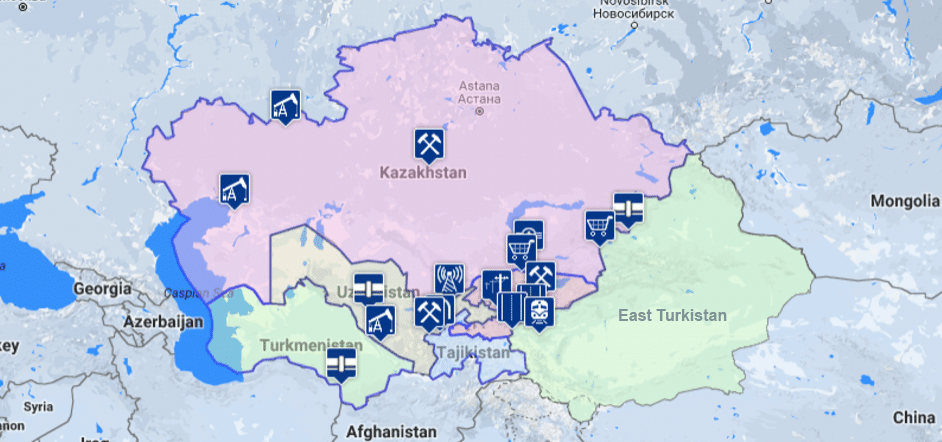
Map of East Turkistan in relation to the rest of Central Asia. East Turkistan is the same size as California, Arizona, New Mexico, Colorado, Utah and Nevada combined.
Source: International Crisis Group
Starting with the aforementioned Karakhanids in the 10th century, Islamic institutions were founded and devoted to the study of theology, natural science, arts, music, and more. These institutions allowed for the emergence of hundreds of prominent Turkic scholars, who helped shape and record Islamic, Turkic, and specifically Uyghur history through their works: The likes of Mahmud Kashgari’s Dīwān Lughāt al-Turk, the first comprehensive dictionary of Turkic languages. Yusuf Khās Hājib’s Kutadgu Bilig, a mirror-for-princes in prose from the 11th century that shed light on Turkish-Islamic history and culture, and is perhaps one of the earliest surviving Turkic works in the genre of akhlāq (Islamic morality and ethics). The Turks of the region have also been greatly impacted by the Yasawī sufi order which helped make communal dhikr gatherings part and parcel of Uyghur culture. The influence of sufism is also evident in the prevalence of Sufi shrines — most of which have since been systematically destroyed or left abandoned after being blocked off with barbed wire by the CCP.
The survival of old Quranic manuscripts from the area, as well as manuscripts from the 19th and 20th century, testify to the centrality of the Islamic intellectual tradition and its preservation within Uyghur culture. Thousands of beautiful mosques were constructed throughout the region, many of which have been demolished in recent years by the CCP regime. Had they not been places of great significance and visitation, it begs the question as to why the Chinese government would bother razing them. Kashgar, the historic capital of the Karakhanid Empire and “jewel” of the Silk Road, became a prominent center of learning and hub showcasing the rich Uyghur past. Yarkend had also been a particular center of Islamic learning and culture for centuries, with dozens of madrasahs present in the last decades of the nineteenth century. It even holds Queen Amanisa Khan’s shrine, where the 12 Muqam (classical Sufi dance and song performance pieces that are a central Uyghur heritage form) were established.
It is now clear that not only have the vast majority of Uyghurs been Muslim since the 11th century at least, but that the history of East Turkistan cannot be separated from that of the greater Muslim world. Like most Turkic Muslims, Uyghurs have traditionally belonged to Ahl as-Sunnah (the mainstream and overwhelming majority of Muslims), the legal school of Hanafism, and have immense love for the noble Ahl al-Bayt (family and descendants of the Prophet Muhammad ﷺ). Uyghurs had even established a maqam (shrine) dedicated to the 8th century scholar and descendant of the Prophet ﷺ, Imam Jafar al-Sadiq – through whom Habib Ali traces his lineage back to the Prophet ﷺ – near the town of Khotan in East Turkistan, which was destroyed by the CCP. If segments of Uyghur society are not practicing Muslims today, it is mostly due to the Communist repression since WWII, just as Soviet anti-religious repression led to the radical decrease in religious literacy and practice in neighbouring Turkic republics. Nonetheless, it is noteworthy and heartening to see that some of the Central Asian republics are currently experiencing a gradual revival of Islamic observance thanks to the demise of oppressive policies, hinting at how the Uyghur religious life could flourish if and when repressive policies in East Turkistan cease.
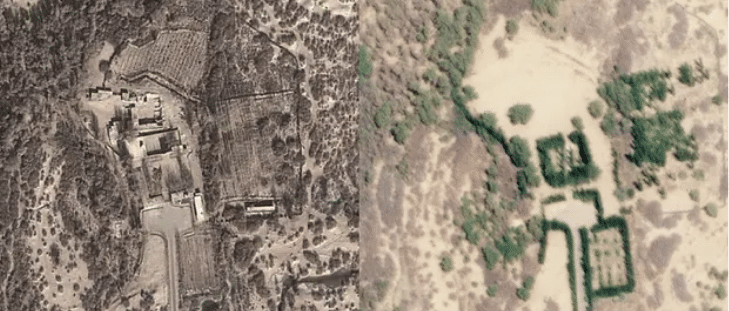
Before and After of Imam Jafari al-Sadiq shrine. L-R Dec 10 2013, April 20, 2019.
Photograph: Google Earth/Planet Labs
The systematic aggression with which the Chinese government has sought to stamp out the works produced by Uyghur scholars and the many ancient Muslim cities scattered across East Turkistan is evidence of their historical importance. From banning the publication of texts in the Uyghur language, closing all religious spaces, and transforming historic sites into propaganda centers for the dissemination of a sanitized, non-religious, and state-sponsored Uyghur identity, it is clear that the CCP feels not only threatened by Uyghur culture, but is aware of its power in maintaining a social fabric worthy of any independent nation.
And with all of the aforementioned said, we pose the question: Even if the majority of Uyghurs were not Muslim as the shaykh incorrectly claimed, does this excuse Muslims elsewhere of their duty to stand against oppression? Over the course of his commentary on the plight of the Uyghur people, the shaykh himself asked the audience why we [Muslims] are only angry when China oppresses Uyghurs and not the Buddhist Tibetans. Not only does this question contradict his initial premise that the Uyghur community cannot be referred to as overwhelmingly Muslim, but also deeply confuses the listener: “Are we to fight against oppression, regardless of the religion of the oppressed, or not?” We would argue that it is not only an obligation for Muslims, but for all people to resist their own oppression and the oppression of others — especially if this oppression manifests as the criminalization of the most fundamental practices of a people’s faith, Islam in this case. The East Turkistani independence movement itself has always allied itself with those of the Tibetan, Palestinian, and Kashmiri people. It has been incorrectly posited by the shaykh that Uyghurs have only been oppressed for the last 3-5 years. While this is demonstrably false, through the decades-long occupation Uyghurs have faced, what is worse is that he makes this claim in order to draw a false equivalence (between East Turkistan and the Tibetan people) in the hopes of delegitimizing the plight and cause of those in East Turkistan. Worse still, is that when the shaykh is confronted with the truth of the 70+ long years of Chinese colonization of Uyghur lands, he contests its factuality by responding that if China were really so bad then we would see the individual politicians responsible for the colonization personally affected by the Chinese Coronavirus. We question the legitimacy of this apparently necessary correlation and will do so again later in this paper. Furthermore, now that we know that the Uyghur identity is as much an Islamic one as his own Arab identity and that Chinese oppression has been occurring for almost a century, do the scholar’s recommendations change?
#2: Shaykh Al-Jifri claims that the question of Uyghur oppression is a political, not religious, one
We would like to preface this section by making it clear that Islam rejects the false dichotomy between the religious and the secular. What is “political” is not necessarily devoid of religious significance, and what is “religious” is not necessarily apolitical. While the Sharia’s precepts pertaining to siyasah (governance and ‘urfi/customary-public law) are mostly general, with few exact prescriptions established by the sources of Sharia (al-adillah al-sharʿiyyah), Muslims have always conceived of politics as a space bound by Islamic morality and ethics, akhlāq. As with any other dimension of human life, a person’s moral culpability before God extends into the domain of the “political” just as it extends into the domain of the economic, familial, ritual, etc.
While it is true that colonization is often understood as a political phenomenon and not a religious one, religion has featured prominently both as a pretext and the locus of subjugation in China’s crimes against the Uyghur people. China brands its campaign against the Uyghurs as a fight against “Islamic extremism” in an attempt to ride on the coattails of the global “War on Terror” thereby garnering sympathy for its policies — including the imprisonment of millions of Turkic peoples into concentration camps and prisons — and insulate itself from backlash it would otherwise face as a result of its inhumanity in East Turkistan. Like Modi’s India and many Western nations, China exploits the world’s frenzied paranoia surrounding “Muslim terror” to justify its crackdown on innocent Muslims.
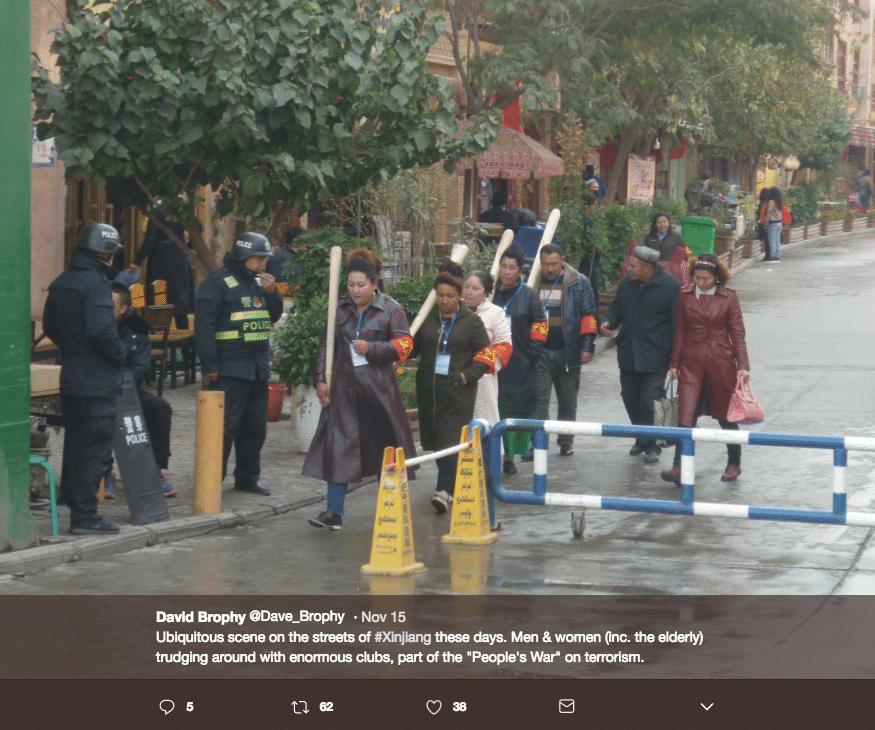
“Ubiquitous scene on the streets of #Xinjiang these days. Men and women (inc. the elderly) trudging around with enormous clubs, part of the ‘People’s War’ on terrorism.” – David Brophy, Nov 15th 2017
We acknowledge, however, that if this matter was purely religious, and not political, we would see Hui Muslims, who do not have a territorial claim at stake, rounded up into concentration camps and being subject to the same forms of oppression Uyghurs and other Turkic people are. However, this is not the case. Huis have historically been left largely undisturbed for the sake of maintaining the CCP’s facade of religious acceptance — or at most they are subject to the usual disruptions any religious group faces under the anti-religious CCP. Historically, the Hui have been staunch supporters of the Chinese state, and even played a critical role in the dismantling of the first East Turkistan Republic of 1933 and the second of 1944.. This did not spare them, however, from the current religious crackdown they and other faith groups like Christians face, once again highlighting the inextricably religious dimension of the CCP’s supposedly merely “political” project. As though rounding up innocents into concentration camps and subjecting an entire people to violations of fundamental human rights as part of a larger campaign of ethnic cleansing and cultural destruction would be anything less than heinous, even if religion played no role in the matter.
Much of Uyghur and, by extension, all Central Asian Turkic identity, has centered on religion; Uyghurs and other Turks are Muslim, just like Malays have been Muslim based on historical development in the past millennium. Historically, up until the 1930s, Uyghurs were not commonly referred to as “Uyghurs” — they and other Turkic Muslims of East Turkistan were simply referred to as “Musulman” (Muslim), “Turki” (Turk), or “yerlik” (local). This truth further explains why China has been so adamant in removing religion from the lives of East Turkistanis — Islam is so critical to the history and culture of the Turkic presence that the CCP knows that, without it, East Turkistanis will be left weak and purposeless– easily converted into malleable forced worshippers of the party, and indistinguishable from the rest of China’s largely atheist, but nominally Confucian, Buddhist or Taoist Han majority. Not to mention that they are then exploited in China’s massive hypocritically capitalistic labour scheme — which most of Chinese masses also suffer from.
Claiming that the oppression is not a religious matter implies that Muslims need not care about the Uyghurs out of religious concern, while in reality our blood should be boiling knowing that the rights of God and His worshippers are being violated by the CCP. Muslims around the world rightly condemn and stand in solidarity against zionist oppression in Palestine, though, by the shaykh’s standards, this would be appear a purely political project undeserving of collective Muslim outrage. The Israeli state-apparatus oppresses Muslim and Christian Palestinians alike. The CCP has singled out Muslims, however, especially those in East Turkistan, as the targets of their brutal project. Again, we see that this is both a religious and political issue against which all Muslims and conscientious human beings should speak and fight. Just as we all wish for the freedom of Palestine sooner rather than later, we should pray, speak, and fight for the freedom of our brothers and sisters in East Turkistan.
Practicing Islam is categorically forbidden in East Turkistan, despite China’s constitutional guarantee of freedom of religion. Islamic texts and names are banned, practicing most of the five pillars of Islam is forbidden, and centuries old Islamic institutions have been destroyed and converted into communist propaganda centers. Religious scholars (ulema) have disappeared, sentenced to life in prison, or killed.
These tragedies are never publicized within China’s borders — and their occurrence is aggressively denied by the Chinese media apparatus. Instead, the media tokenizes and highlights a few religious acts, in reality no more than complex theatrics which the government has directed in order to showcase the power of “CCP Islam”. Journalists and political actors from other countries, especially Muslim ones, are invited to East Turkistan to witness a beautiful charade of “harmony” and happiness that, in reality, is no more than an open air prison for the Uyghurs. Albanian academic and journalist, Dr Olsi Jazexhi, was one of these visitors, who later reflected on his experiences and observations on such a CCP-sponsored trip. He and other journalists toured many mosques with the CCP’s aim being to show to the outside world that there are mosques, and indeed religious freedom, in East Turkistan. Jazexhi recalls venturing into one of the mosques near Urumqi’s Grand Bazaar and finding only a store. He also recalls his visit to a concentration camp or what China calls a “vocational training center”:
“The center was in the middle of the desert. It was a kind of Alcatraz, and by its appearance, we were expecting to find some criminals, terrorists, and killers, and people who were dangerous to society. When we went there, the criminals presented us with a concert. These poor boys and girls who were being held there since many years. They were told to dance to me; Uyghur dance, Chinese dance, and Western dance. The authorities wanted us to film them only dancing and smiling and singing. They were all speaking Chinese, even though they were Uyghurs [sic].”
Jazexhi, a dual Albanian and Canadian citizen, was later fired from his university position in Albania — demonstrating the reach of Chinese economic blackmail diplomacy. The professor was blacklisted by China due to his truthful reports on East Turkistan, highlighting the CCP’s suppression of criticism abroad, even within the context of academia, with its diplomatic and economic pressure.
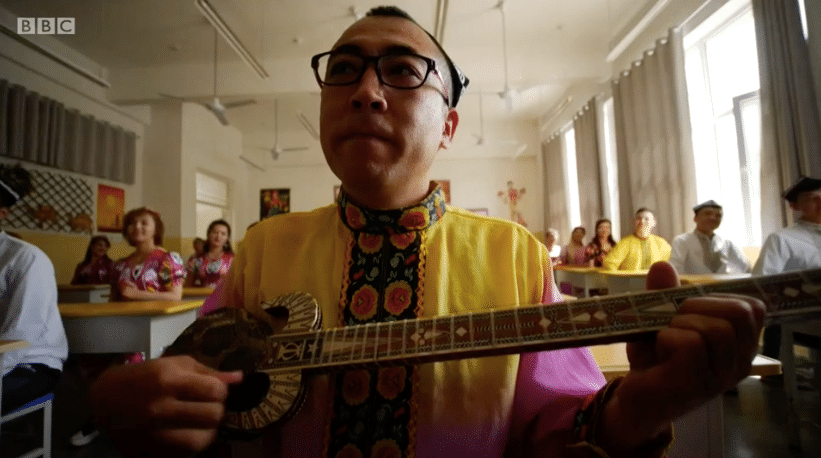
Scene from a staged tour of a ‘vocational training center’. Uyghur detainees are playing music to show ‘harmony’ and ‘happiness’ inside the camps. Source: BBC
Of course, this harmony would not be complete without the millions of Han Chinese who have been settled, with the aid of the government, within the borders of East Turkistan. While Uyghurs are systematically transported outside of the borders of their homeland and into mainland China to work as forced laborers or to be imprisoned and “reeducated”, it is hard to ignore the demographic erasure of Uyghurs in East Turkistan. As more and more Han Chinese are brought into Uyghur land to replace the displaced natives, the CCP razes ancient mosques, homes, and sanctuaries to make room for the new settlers.
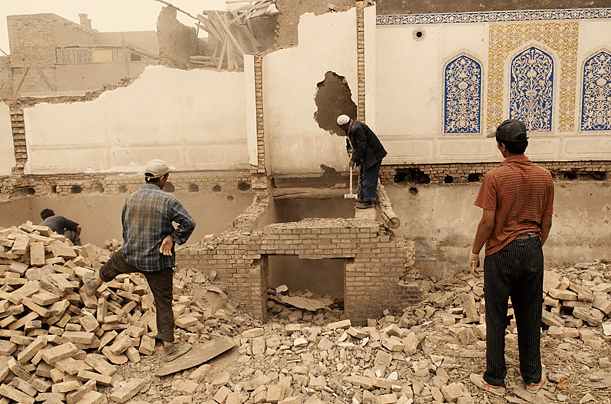
Photo from Gilles Sabrie: “Sledgehammer: The Chinese say Kashgar must be destroyed because it is susceptible to earthquakes” (TIME)
These settlers act both as continuous reminders of the disappearance of Uyghur autonomy as well as wardens over the remaining Uyghur population. There have been many accounts of Han Chinese living with Uyghur families in their homes as “big siblings”— feeding the government information on the family’s every move and assisting in Uyghur imprisonment for even the smallest of religious offences. Aside from simple demographic engineering and ethnic cleansing, the Chinese program of destroying Uyghur cities and patrimony is intended to deracinate East Turkistanis from their culture and make them self-internalize that they are a people with no heritage, and to imprison them in easy-to-surveil panopticons with Han colonialists wardens. Destroying ancient cities and heritage is an old authoritarian communist strategy, reflecting the idea brillianty summarized by Alexander Solzhenitsyn that “to destroy a people you must first sever their roots.”
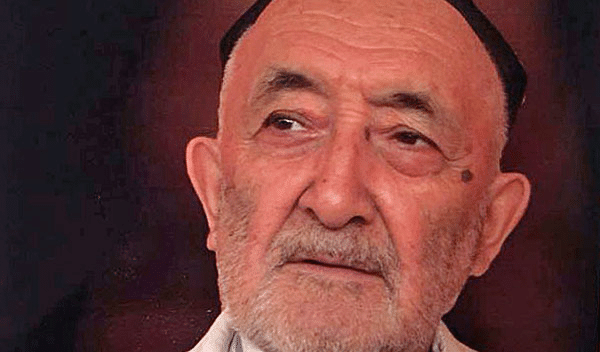
Muhammad Salih Hajim (82), widely known as the first scholar to translate the Quran to modern Uyghur, is amongst one of the martyred and was killed in detention in January 2018. Source: RFA
One former prisoner, Adil Abdulghufur, in an interview with our co-author, Aydin Anwar, recounted how he was beaten unconscious by Chinese prison authorities and forced to wear a 25 kg cement block for a month hung by a thin string around his neck after saying “Bismillah” (in the name of God) in his sleep. Countless Uyghur women and men, who have been sent to camps and prisons due to religious practice have been raped, forcibly sterilized, drugged, and their bodies used for organ harvesting. Uyghurs are punished with long prison sentences; one Uyghur woman was sentenced to 10 years in prison for promoting the wearing of headscarves, a Kazakh man was sentenced to 16 years in jail after Chinese authorities found audio recordings of the Quran on his computer, and several Uyghur refugees we have spoke with said that even saying the Muslim greeting Assalāmu Alaykum (Peace be upon you) can get them locked up for 10 years. Saying Insha’Allah (God-willing) is also prohibited. In one of the many documentaries published on the dystopian existence of the Uyghur people, VICE interviews a woman who states her charged crime was the learning of the Quran and the Arabic language. A man, later in the documentary, details how he was punished for refusing to eat pork even while imprisoned. By many accounts, the word God or Allah itself must be replaced with “Party” (Chinese Communist Party), or the name of the Chinese president, Xi Jinping.
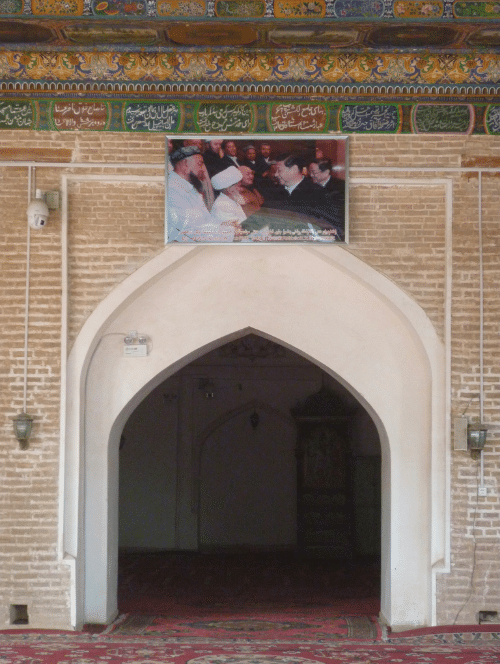
Portrait of Chinese President Xi Jinping shaking hands with Uyghur Imams placed in Kasghar’s historical Id Kah (Eidgah) mosque in East Turkistan. Note that the picture is facing the congregants in the direction of Muslim prayer – Qiblah. Source: David Brophy
#3: Shaykh Al-Jifri claims the reason people are fighting for East Turkistan is because they do not want China to build the so-called ‘New Silk Road’ and become 2x as strong as America economically
This claim reduces the East Turkistani freedom movement to a China vs America binary– thereby completely erasing the decades of occupation East Turkistan has endured under China. In 1759, the Manchu Qing Empire invaded East Turkistan and made it its new colony. Uyghurs rebelled against Qing rule, and in 1863 were able to break free and establish Kashgaria under their leader Yaqub Khan, now known as East Turkistan. Two decades later, the Uyghurs were invaded by the Qing again, and, this time, the Uyghur homeland was formally incorporated under the Chinese empire as “Xinjiang”. Chinese nationalists overthrew the Manchu Qing Dynasty in 1911, putting East Turkistan under the rule of Nationalist China. The Uyghurs carried out numerous rebellions and were able to establish the East Turkistan Islamic Republic in 1933 and 1944, both of which briefly lasted before the Chinese government reoccupied the region through the military intervention and political interest of the Soviet Union. The most recent occupation started in 1949 when the Communist Party of China came to power, and since then, millions of East Turkistanis have been subject to various forms of brutal systematic genocide.

The Declaration of Independence of the Islamic Republic of East Turkistan, November 12, 1933 Note: As is visible, the local ulema/scholars spearheaded the effort for independence.
It is deeply condescending to not only delegitimize the efforts of a Muslim people in standing against their oppressors, but to also deem them to be no more than American pawns. Indeed, Xi Jinping’s China seeks to continue solidifying Chinese hard power in East Turkistan while working towards the larger CCP strategic goal of establishing China as a global hegemonic power with a new Chinese-dominated global economic-political order, via the multi-trillion dollar One Belt One Road (OBOR) Initiative. This strategic-economic project — the largest the Eurasian Landmass ever seen — spanning over 70 countries via railroads, gas pipelines, and other infrastructure projects, is one of the greatest attempts of China to secure itself a superpower position in the 21st century. Without East Turkistan, deemed by the CCP the “Chinese gateway” to Eurasia and the West in general, the entire OBOR initiative’s immediate feasibility is truly brought into question. In addition to this strategic importance East Turkistan, the land of the Uyghurs is also extremely rich in oil, gas, and coal. According to a 2016 Congressional Research Service report, the region contains the second-highest natural gas reserves and highest oil reserves of any province-level jurisdiction of China, reportedly producing more than 30 BCM of natural gas in 2015.
A statement that reduces the intention of the freedom movement to a simple modern economic enterprise further belittles the rich history of a people that once lived with centuries of independence, and its rightful effort to reclaim its full rights and freedom. The Uyghurs played a crucial role in establishing the Koktürk Khanate (552-744), the Uyghur Khanate (744-840), the Kara-Khanid Khanate (840-1212), Gansu Uyghur Kingdom (848-1036), and Idiqut State (856-1335). They lived co-independently in the Mongol Empire, even playing crucial roles in its administration through Gengiz Khan’s usage of the Uyghur yasa law system and the Uyghur script. After the Chagatai Khanate, East Turkistan was integrated into the Turkic-Muslim milieu of the larger Turkistan stretching from the Caspian to Mongolia including cities and polities like Bukhara, Samarkand, Kokand, etc. with scholars, traders and others moving east and west. Thus, it is truly ridiculous to understand the issue of Uyghur colonization solely through a lens of Sino-American politics. The colonization of East Turkistan began long before China was a real contender in the quest for international political-economic hegemony, and will continue –ceteris paribus– long after a change in the foreign policy of either the United States or China. The recent interest American politicians have taken in the plight of the Uyghurs has never even clearly crossed into the realm of East Turkistani independence– it is Uyghur, Turkic, Muslim, and anti-colonial activists who are at the forefront of the East Turkistani independence movement. Just as it was completely understandable that Afghans accepted American assistance in the fight against Soviet occupation, and that the Viet Cong accepted Chinese assistance to protect against American invasion on the other hand, the Uyghur crisis is so dire that the people are justly tempted to accept the assistance of any powerful nation against the century long Chinese oppression they have faced. Had China, under the yoke of CCP, not suffocated the Muslim peoples inhabiting East Turkistan, Uyghurs could maybe regard China differently…
The only way to secure Uyghurs and other East Turkistanis their essential rights — to practice their faith, operate economically, and take pride in their rich culture and history without fear of imprisonment, assault or death — is to secure the sovereignty of their occupied homeland. For many Uyghurs, the human rights/autonomy discourse is dead. The Chinese government has proven over the course of its long occupation that it can never guarantee Uyghurs the safety or the freedom they deserve. Although China claims Uyghurs to be one of its “proud 56 ethnic minorities”, it sees Uyghurs not only as foreigners, as made clear with their completely distinct language, history and culture, but also as existential threats to its despotic power. As internal but “foreign” threats, the Uyghur people have been imprisoned, enslaved, indoctrinated and murdered. There can be no going back after this horror. The only solution is for the Uyghur people, completely foreign to China, to formally exist outside of the jurisdiction of the Chinese government as their own nation.
#4: Al-Jifri asks how COVID-19 can be divine punishment if Communist Party authorities themselves remain untouched by the virus
While we agree with al-Jifri that we are in no position to state definitely whether any worldly occurrence is a direct act of Divine punishment, we question a few of the implications presented during the lecture. For example, the shaykh asks how the coronavirus pandemic can logically be considered Divine punishment if the individuals, who made the governmental decisions resulting directly in the oppression against Uyghurs, themselves remained unscathed by the virus. We respond: How can a virus which has debilitated the economy and social structure of a country, whose government is committing genocide against millions of colonized peoples, including millions of Muslims, not be? This article does not aim to delve into a metaphysical discussion on the nature of blame and culpability, but we can simply ask how the shaykh knows that none of those individuals he identifies did not fall ill.
Additionally, we question why such a punishment could not target an entire corrupt regime — or even a complicit or apathetic populace — and not simply certain individuals, who he might deem actually culpable.
The fact of the matter is this: We do not know how many of the Uyghurs who are trapped in concentration camps, prisons or forced labor factories, have been additionally subject to this seperate CCP oppression — a virus which only became as terrible of an international menace as it has due to the deception and inadequacy of the CCP. We hope their number is very low, but also understand that the illness of Uyghurs does not indicate that the CCP is any less problematic or morally horrific in its dealing with the virus and with the regime’s colonial holdings. The shaykh also asks why other oppressors would not be more deserving of a plague such as this one. To this we repeat the shaykh’s question to himself: Who are we to question God’s methods? The burning of the Amazon is not certainly a punishment for the South American nations whose borders it crosses, or it may be a punishment for humanity at large — we cannot know.
It does not take an act of divine punishment for us to recognize the immorality of an action or event. We do not wait for lighting to strike us down before we realize we may have committed a misdeed. In the same way, we do not know if COVID -19 is divine punishment, but we do know that the oppression of Uyghurs is a moral outrage and requires immediate international action, especially from fellow Muslim brethren.
As previously noted, we do not seek to act as interpreters of God’s will. On the contrary, we only seek to act according to a well-established Islamic tradition of taking ʿibrah, a lesson derived from a moral experience, from what we observe in the world. Even while carefully performing this observation, we acknowledge that our derivations are zannī, or of uncertainty. This being said, we believe that our history and faith have so clearly called for justice and religious freedom that to ignore the direct suppression of Islam or Muslims, especially through means as violent and cruel as those practiced by the Chinese Communist Party, is to commit a definitive moral misdeed.
This kind of deduction by ulema and regular Muslims alike has been practiced for centuries. One pertinent example is of an individual named Mirza Ghulam of Qadiyan, who apostatized from Islam in the late 19th century as a claimant of prophethood, and experienced a rather gruesome death due to dysentery. His downfall has been commonly interpreted (taʾwīl) as punishment, for his attempting to act as a divinely ordained prophet of God. This kind of informed and qualified interpretation has been performed for centuries and is allowed for any individual so long as they ultimately believe in the finality of the Knowledge and the Will of God. W’Allāhu Aʿlam (God knows best).
Action Items & Closing Notes
We do not seek to find out the intention of Habib Ali al-Jifri’s speeches on the situation of our Uyghur brothers and sisters – he may have simply been misinformed. What we can do, however, is question the sources of his information and highlight the graveness of his actions and words. The fact of the matter is that millions of Muslims are detained by China for committing simple acts of faith that people elsewhere have the pleasure of doing each and every day– including saying “Bismillah” before they take a bite of food. As we observe Ramadan currently, it is devastating to think of the Uyghurs, who are forced to eat and drink, let alone drink alcohol and eat pork, during the holy month to prove their “innocence” from Islam to the Chinese government. While we sit with our families and break our fast, Uyghurs and other Turkic people suffer silently in thousands of prisons and labor camps far from their families.
This scholar, or those who have misinformed him, have not only dismissed the CCP’s violations against our religion and the Ummah at large, but have also attempted to disincentivize hundreds of thousands of free Muslims from aiding the Uyghur people in their plight against the CCP.
We ask that you to pray that the oppression of the Uyghur people ceases as soon as possible; but also urge you to boycott Chinese or Chinese-made products likely to be reliant on Uyghur slave labor; to actively spread the word on the suffering of East Turkistan; and to build interest groups and networks to pressure governments to lower their dependency on China, while increasing economic and political collaboration between Muslim people. Change starts with and around each and every one of us; inquire about Uyghur-East Turkistani exiles in your area and country, and organize your communities to help stranded Uyghur orphans, students and other disadvantaged individuals survive as Muslim Uyghur people with their culture. Lobby for issuing Uyghurs passports and securing Uyghur emigres refugee-asylee status and protection. Stop “extradition-repatriation” of Uyghurs to China. Call for a united diplomatic effort of Muslim, Arab, and/or Turkic and others concerned for freedoms countries against China’s atrocities. They should act according to inter-state relations and not as slavish would-be vassal states, and hold a respectable diplomatic stand vis-à-vis China from our countries.
We ask that you get your universities involved by both raising awareness on campus as well as by assessing your university’s relationship with China. Check to see if your school has a Confucius or China Institute. These entities often serve as a public educational arm of the Chinese government abroad, and are controlled by the CCP — thereby enabling them to exercise soft power all over the world. Insist that these institutes make a statement and acknowledge the atrocities faced by those in East Turkistan, and call them out if they do not. Call for a double background check for Chinese researchers lest they actually be informants as often happens in the U.S. Countless events and panels discussing the horrors committed by the CCP have been canceled by universities around the world due directly to Chinese pressure. Call for university endowments to divest from China. Finally, call on your school to increase funding for Uyghur/Turkistani studies and to set up scholarships and grants to assist exiled Uyghur students and scholars — their lived experiences are essential to hear, accept, and make sure fewer people have to go through again.
It is important to ensure the political and economic independence of academia– without which generations of students will maintain worldviews colored by propaganda and complicit in the oppression of millions. Insist that your school cuts ties with Chinese bodies violating academic freedoms, similar to how Cornell cut ties with a Chinese university. Hold your universities accountable regardless if they are directly complicit in, or just silent on, the human rights abuses China commits. Demand that these important institutions divest from these China and the CCP.
We have seen large-scale protests across the Muslim world, especially in countries, whose governments have remained silent against the oppression in East Turkistan for fear of Chinese retribution, and hope to see even more people push their governments to pressure the CCP. The shaykh encourages members of the audience to maintain an Islamic guiding moral principle and to act on it. We agree with this wholeheartedly — but we vigorously disagree with his calls to (in)action. Instead of focusing only on ourselves and our individual economic and academic developments, we also hope to fight for the Uyghur and other Turkic people’s ability to do the same — to practice their faith, live without fear of imprisonment, and in a homeland that is formally their own. This is not a hopeless cause– our voices can and must be heard, inshAllah.
عَنْ أَنَسِ بْنِ مَالِكٍ رضي الله عنه قَالَ رَسُولُ اللَّهِ ﷺ إِنْ قَامَتْ عَلَى أَحَدِكُمْ الْقِيَامَةُ وَفِي يَدِهِ فَسْلَةٌ فَلْيَغْرِسْهَا
From Anas Ibn Malik, Allah be pleased with him: The Prophet Muhammad, the Peace and Blessings of Allah be upon him, said: if the day of judgement is upon you, and in your hand is a seed, plant it.
Action Items:
- Keep making Dua for the oppressed of East Turkistan and the world
- Boycott Chinese products– do not be complicit in slave-labour
- Raise awareness on the plight of Uyghurs and the East Turkistani cause, learn more at SaveUighur.org
- Work towards reducing your country’s economic dependence on China
- Build alliances with all people of conscience to demand a cessation of China’s oppression of all faith groups, be it Muslim Uyghur, Hui, Christian or Tibetan Buddhist
- Encourage and promote fairer trade and commerce with Muslims and others rather than China
- Inquire about Uyghur diaspora members in your area. Organize to help out orphans, widows, and students.
- Pressure governments to provide legal protection to Uyghur refugees-exiles by either citizenship or refugee-asylee status. Stop the “extradition-repatriation” of Uyghurs to China!
- Get your universities-endowments to divest from China. Raise awareness about Chinese espionage and hired guns in academia. Demand academic and financial support for Uyghur scholars and students. Request more academic attention and funds for Central Asian, Uyghur, Turkistani studies.
Dislclaimer: The authors acknowledge Habib Ali’s willingness to retract his statements, and appreciate his dua for the oppressed Uyghur when faced with rightful criticism. However, the retraction came to our attention towards the very end (on May 12, article published May 14) of writing the piece (a month long process) and despite being a welcome move, does not remove the falsehood of most of his takes. He only corrects the first item from his otherwise totally-problematic takes. After an online correspondence with Uyghur activist Abdulghani Thabit, Habib Ali only corrected his statement number 1 from the longer talk. The three other misleading takes remain and were thus addressed in the piece. The authors tried their best to give all due respect to someone who dons the mantle of ‘scholar’. Our intention is not to attack Habib Ali or any other scholar, rather we seek to use his misleading commentary (corrected albeit in part by the Shaykh later) as a segue into educating the largely ignorant Muslim masses susceptible to Chinese propaganda on Uyghurs and the East Turkistani cause.
Here is a condensed Arabic version of this article translated by Imam Abdul Jabbar
Keep supporting MuslimMatters for the sake of Allah
Alhamdulillah, we're at over 850 supporters. Help us get to 900 supporters this month. All it takes is a small gift from a reader like you to keep us going, for just $2 / month.
The Prophet (SAW) has taught us the best of deeds are those that done consistently, even if they are small. Click here to support MuslimMatters with a monthly donation of $2 per month. Set it and collect blessings from Allah (swt) for the khayr you're supporting without thinking about it.
Toqa Badran is a recent graduate of Columbia University where she earned a degree in political science and anthropology, and advocated for the rights of minority students. She will be returning to the university as a graduate student to study the history and cultures of Muslim societies, especially in premodernity. Her grassroots organizing has mainly dealt with anti-colonialsm and advocating for the rights of economically, politically or religiously subjugated people globally. Aydin Anwar is an Uighur American and Outreach Manager of the Save Uighur campaign under Justice For All, a 501(c)(3) human rights non-profit dedicated to issues on Muslim oppression. During her youth and college years, she had worked heavily in East Turkistan advocacy by raising awareness through media, film, public speaking, and working on relief efforts for Uyghur refugees in Turkey. She has spoken on multiple media outlets, with her most notable piece on Now This garnering over 100 millions views worldwide. Aydin holds a BA from Duke University in International Comparative Studies.


Where Does Your Dollar Go? – How We Can Avoid Another Beydoun Controversy

When Honoring Parents Feels Like Erasing Yourself | Night 3 with the Qur’an

Bipartisan Rot Uncovered As British Crackdown On Pro-Palestine Activists Falters

An Unending Grief: Uyghurs And Ramadan Under Chinese Occupation

5 Signs Your Teen is Struggling with Imposter Syndrome | Night 2 with the Qur’an

How to Make this Ramadan Epic | Shaykh Muhammad Alshareef

[Podcast] The Parts of Being an Imam They Don’t Warn You About | Sh Mohammad Elshinawy

[Podcast] Guardians of the Tradition: Muslim Women & Islamic Education | Anse Tamara Gray

Op-Ed: Bitterness Prolonged – A Short History Of The Somaliland Dispute

Green March In The Sands Of The Blue Sultan: Morocco And The Conflict Over The Western Sahara

When Honoring Parents Feels Like Erasing Yourself | Night 3 with the Qur’an

5 Signs Your Teen is Struggling with Imposter Syndrome | Night 2 with the Qur’an

Who Am I Really? What Surat Al-‘Asr Teaches Muslim Teens About Identity | Night 1 with the Qur’an

[Podcast] Guardians of the Tradition: Muslim Women & Islamic Education | Anse Tamara Gray

How to Make this Ramadan Epic | Shaykh Muhammad Alshareef
Trending
-
#Current Affairs1 month ago
[Podcast] Should Muslims Ally with Conservatives or Progressives? | Imam Dawud Walid
-
#Current Affairs1 month ago
Op-Ed: From Pakistan To Gaza – Why Senator Mushtaq Ahmad Khan Terrifies Power And Zionism
-
#Islam3 weeks ago
How to Make this Ramadan Epic | Shaykh Muhammad Alshareef
-
#Life3 weeks ago
[Podcast] The Parts of Being an Imam They Don’t Warn You About | Sh Mohammad Elshinawy









Wael Abdelgawad
May 13, 2020 at 4:27 PM
Thank you so much for enlightening us about the Islamic history of East Turkestan, and the shocking depth of the oppression happening there. Sadly, there are many so-called Muslim leaders who benefit financially and politically by allying themselves with the Chinese Communist government, against their own brothers and sisters. Such people are the lowest of the low.
Ashaq
May 13, 2020 at 10:36 PM
Just another celebrity Scholar that needs to be put on the ignore list.
Habeeb
May 14, 2020 at 8:11 AM
We have no any right to judge the Scholastic power of shiekh.there might be fault.we all are ‘insan’..which derives from ‘nisyan’..so forgive..but don’t use this to undermine his spiritual greatness.jazakalllah.
Abu Ali
May 16, 2020 at 8:24 PM
There was no intent to judge “scholastic power”. Whatever in the heck thats supposed to mean. Your comment about insan doesn’t make much sense either. This piece was written to defend the Muslims. Best not be a jifri worshipper.
Wulf Nesthead
May 17, 2020 at 5:29 PM
It looks like the brother was referring to the comment to which he was replying, not to the article itself. I agree with his sentiment, if not his grammatical phrasing: the scholar may be in error in this matter, but that is neither a reason to dismiss him as “just another celebrity shaykh” nor a reason to ignore his considerable scholarly contributions on other matters.
That goes for the comment, not for the article itself, which is outstanding; and I pray that its message gets the exposure and reception it deserves.
Habeeb
May 14, 2020 at 8:19 AM
Good one to understand the sufferings of Uyghur Muslims.But lack in the way used to refute a argument.dont use this to undermine the Scholastic power of shiekh.judge his words on the context.Morover he has already corrected this.
Amir
May 14, 2020 at 12:04 AM
It’s true the Muslim world failed east Turkestan just like the muslim world failed Palestine, Afghanistan, Iraq, Syria and everywhere else they are being oppressed and blood spilled but for the love of god don’t manipulate our emotions and make the muslim world a tool for other communities interest to destabilize china in a proxy fashion. Mike Pompeo Doesn’t give a crap about Uighurs or Muslims We saw her thank him! Muslim blood is finger licking good off his hand. We are all sinful until oppression is lifted and I don’t have the solution. This article at best is emotional driven but lacks wisdom and complete understanding. If you cant see the political element between China and its geopolitical oppositions which they will come to an understanding at the cost of the Uighrs then god help you.
Aydin Anwar
May 14, 2020 at 12:17 PM
Assalamu Alaykum. It seems you either simply did not read section #3 of the article or did not understand what you read. Go over it again please.
Amir
May 15, 2020 at 12:02 AM
Wa alaikum salam,
I did read it and I reread it out of respect to make sure I didn’t miss anything. I Stand 100% with eastern Turkestan but I am not going to pretend like the Chinese and Russian political moves land, sea, economic, influence, diplomacy and what have you and the counter moves from their oppositions are not as obvious as day. We all failed, me being the first one, and I don’t know how to rectify it. If you think congress or Pompeo gives a hell and you are looking towards them to get your rights as they bless the annexation of Palestine and continue to kill us all over the world then you’re delusional. Many tried that before you afghans in the 80s and kurds recently. it’s the same game that’s being played over and over. To them our Uighurs brothers and sisters are just a tool in their tool box to achieve their goals. I know talk is cheap and it’s easy for people to say anything but a Muslim is a Muslim I don’t differ on race and I am from a back round that knows a thing or two about oppression and I don’t want it on anyone it’s important to navigate wisely we might be in a worldly hell right now we have to find a way to climb out not go to the lowest part of the worldly hell. May Allah rectify our affairs and may he give every Uighur a joy of sweetness and comfort with his presence.
search4guidance
May 14, 2020 at 9:06 AM
Thank you for providing this information. Could you kindly provide a link to his post of the refutation?
Aydin Anwar
May 14, 2020 at 2:56 PM
Assalamu Alaykum Muhammad, thank you for your comment. We will be adding a disclaimer regarding this shortly, but adding it here as well. The authors acknowledge Habib Ali’s willingness to retract his statements, and appreciate his dua for the oppressed Uyghur when faced with rightful criticism. However, the retraction came to our attention towards the very end (on May 12, article published May 14) of writing the piece (a month long process) and despite being a welcome move, does not remove the falsehood of most of his takes. He only corrects the first item from his otherwise totally-problematic takes. After an online correspondence with Uyghur activist Abdulghani Thabit, Habib Ali only corrected his statement number 1 from the longer talk. The three other misleading takes remain and were thus addressed in the piece. The authors tried their best to give all due respect to someone who dons the mantle of ‘scholar’. Our intention is not to attack Habib Ali or any other scholar, rather we seek to use his misleading commentary (corrected albeit in part by the Shaykh later) as a segue into educating the largely ignorant Muslim masses susceptible to Chinese propaganda on Uyghurs and the East Turkistani cause.
Ff
May 14, 2020 at 4:24 PM
You misled people by publishing something despite having had knowledge of it being retracted.
Abu Ali
May 16, 2020 at 8:28 PM
Jifri misled people. This article’s was to clear things up. Direct your frustrations where they started, aka jifri. Respect the shaykh, don’t worship him.
Muhammad Jawad
May 14, 2020 at 10:48 PM
I was referring to statement number 1. It is dishonest of you to include something you know does not illustrate the reality of the Shaykh’s views.
I wasn’t referring to the rest of the response, which contains many strawman arguments and contradictions.
Abu Ali
May 16, 2020 at 8:26 PM
Great, maybe he can post this refutation as well. The more the better. Who knows the amount of damage he’s done. The more he corrects himself the better.
Faiz ali
May 22, 2020 at 7:26 AM
thanks for sharing good article.
Faiz zulfiqar
May 22, 2020 at 7:26 AM
thanks for sharing good article.
Nuha
July 19, 2021 at 6:08 PM
I don’t usually comment on Muslim matters articles, but I HAD to say something here! We can’t claim to be anti-imperialist without actively exposing the lies the Western world spreads about countries they want to invade! The things the western governments and media say about China might hit a sweet spot with Muslims, since they conviently give us another reason to hate China aside from their anti-religiosity, but we can’t be so blinded by prejudice that we go along with such a dangerous narrative. Remember the early 2000s and how jingoistic the media was, pertaining to the Middle East? Perhaps the only thing that made Muslims not believe it was the demonization of our people and our religion. Let’s be compassionate, people! We are capable of defending the government of China from lies, while acknowledging there are genuine matters we can condemn them for. Allowing such lies to proliferate might make it so that we all agree with it when America finally decides to invade China. Basically, it does the imperialists’ work for them. Don’t let prejudice keep you from searching from the truth. I don’t blame any sheikh that’s spoken in error on this subject. No one living in the western world is immune to the propaganda machine.
Connection
September 2, 2021 at 7:32 AM
We should support this and I will also do it. Meanwhile great and informative article.
Ahmed Warsame
October 2, 2021 at 7:07 AM
This was really well written, alhamdulilah
Abu Isma'il
April 29, 2022 at 12:34 PM
At Abu Ali. Nobody is worshipping Habib Ali. This is a figment of your takfiri imagination.
Ali
February 27, 2023 at 5:31 AM
Great article! The insights and tips provided were very helpful for my personal development.
Imran
February 27, 2023 at 5:37 AM
I appreciate how this article is explained in a clear and concise manner. Very informative!